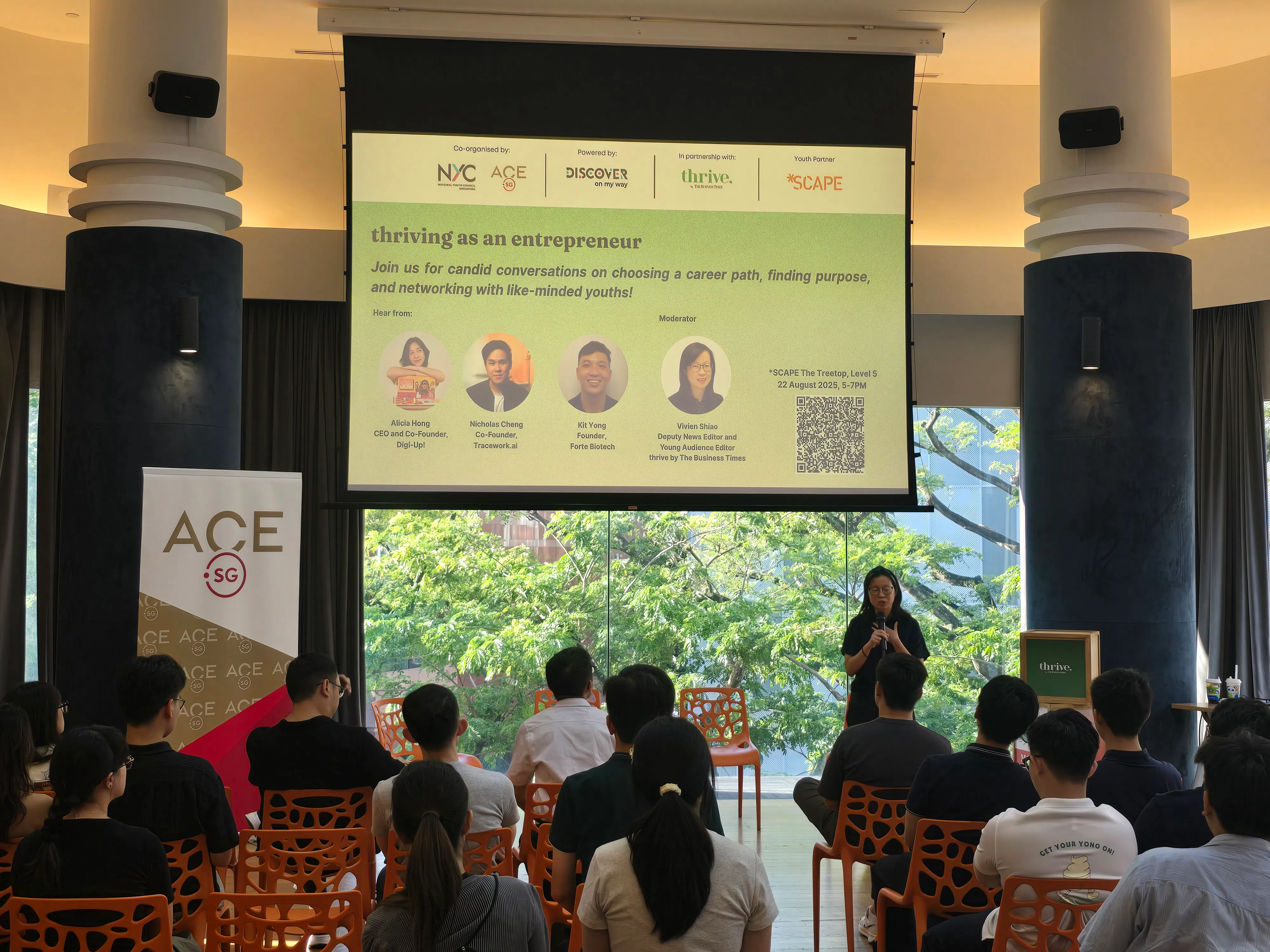So you want to be your own boss? Read this first

Straight to your inbox. Money, career and life hacks to help young adults stay ahead.
[SINGAPORE] At the Thriving as an Entrepreneur fireside chat moderated by thrive last Friday (Aug 22), three young entrepreneurs shared candid insights on being your own boss.
The three panellists were:
- Alicia Hong, CEO and co-founder of Digi-Up!
- Nicholas Cheng, co-founder of Tracework.ai and VideoPulse
- Kit Yong, founder of Forte Biotech
About 50 attendees were at the event held at *Scape and co-organised by the Action Community for Entrepreneurship (ACE) and the National Youth Council (NYC) Singapore.

Here are edited excerpts from the panel discussion and question-and-answer session.
🔎 What is the most important thing budding entrepreneurs should note? Hong: Always be ready to unlearn what you know.
Entrepreneurs often enter the market and launch a product, thinking they know what’s best and what is going to work out.
Navigate Asia in
a new global order
Get the insights delivered to your inbox.
Sometimes, it yields results. Take Airbnb, for example, they started their company with the assumption that travellers would want to rent and stay in strangers’ homes.
But while solutions are banked on presumptions, they may not always hold true.
So, be aware of the assumptions you make and be prepared to face the truth. Such that when you need to, you can adapt accordingly.
🤝 How do you find mentors?
Cheng: If you’re from (the National University of Singapore), there’s the tech ecosystem builder, BLOCK71, where you can connect with other founders and mentors.
But even with initiatives like this, don’t expect to be handed a list of mentors. You still have to do the work and reach out to them yourself.
Not everyone will be eager to help you either. Most of the time, mentors are selective and will only help you if your business aligns with their goals, too.
Yong: If you are already doing business with paying customers, they are your best mentors.
Learn what they truly want, so that you can produce better products for the very people your business runs for.

🙅🏻♀️ What’s an entrepreneurial advice that sounded wise but turned out to be wrong?
Cheng: Fake it till you make it – I don’t like that phrase.
When you hit big milestones like getting your first customer, yes, post it on LinkedIn. I’ll admit I did that a lot at the start.
But there is no point in being too flashy about your accomplishments – you still have to know your stuff.
Interestingly, I’ve come to realise that when I’m more down-to-earth, my customers are more willing to return feedback.
Yong: I remember when I was still starting out, one of the first things I heard was “making profits is not very important, we are looking at growth.”
Perhaps this may work for some, but I think that advice isn’t always true.
🏆 What does entrepreneurial success look like to you?
Yong: Cash flow positivity.
To me, success looks like running at a plus every month – which is the main purpose of a business. This ensures I can deliver good products to our customers and support my team.
Hong: For social enterprises, success may look a bit different.
There are two baselines that I have to look at: my social impact and the amount of profit I make.
At one point, I became so preoccupied with hitting my social impact numbers, I was even willing to do our projects for free.
But without profits, I wouldn’t even be able to sustain my business. So, to achieve success, one has to balance impact and profitability.
After all, if your business doesn’t make money, it’s not even considered a business anymore.

🏫 Is it worth dropping out of school to pursue entrepreneurship?
Yong: Don’t.
Truth to be told, when you start a business in school, others tend to “give you face” and take you more seriously – which helps especially when you are just starting out.
Running your own business also doesn’t guarantee a higher income – at least in Singapore.
In honesty, by becoming my own boss, I actually earn less than my peers.
So if anything, having a degree or qualification still serves as something to fall back on.
🧑🎓 How can students further their startup dreams in school?
Hong: Go for hackathons and incubator programmes.
If you choose to start a business by yourself, in your room, that is honestly the toughest route you could ever choose to take.
These structured programmes connect you with potential co-founders, mentors and even grants or venture capital.
I actually started Digi-Up! through a hackathon back when I was still in Singapore Polytechnic. So I understand the struggle of having to run a company, pursue internships, do school and CCAs, all at once.
I won’t sugarcoat it; this path is tough. But I still encourage students to try entrepreneurship, because it will test how committed you truly are to your pursuit.
Cheng: If you are unsure about starting your own business, I think something more practical is to pursue internships at startup companies – even the unpaid ones, just to get your hands dirty.
At these internships, you often have more freedom to curate your own learning experience and reach for more opportunities. You will get to see the inner workings of running a business – which normal internships don’t offer.

😰 Did you have any fears or concerns when you started your business?
Yong: Of course, I have fears.
I even get nightmares about not producing a good product or going into debt. These are actually realistic fears for many entrepreneurs.
It is a very stressful job, and I can understand why it is not uncommon for business owners to have mental health struggles.
But if you ever find yourself feeling distressed, it is important to seek professional help.
Cheng: I worry about not being enough, because it seems there’s always more to achieve.
It’s easy to fall into an endless cycle of comparisons. But there will always be someone else doing better than you, and your benchmark for success will keep shifting further – unless you set your goals straight.
But if at any point your mental well-being takes a toll, it is okay to set aside time and money to seek psychological help – something I hope to normalise.

TL;DR
- Be ready to unlearn what you think you know and adapt
- In school, there are plenty of outlets to make connections and seek mentors
- Not everyone will be willing to help you, and not every bit of advice may be sound
- The entrepreneurial journey is tough, but achieving success should never come at the expense of your mental health
Decoding Asia newsletter: your guide to navigating Asia in a new global order. Sign up here to get Decoding Asia newsletter. Delivered to your inbox. Free.
Copyright SPH Media. All rights reserved.


